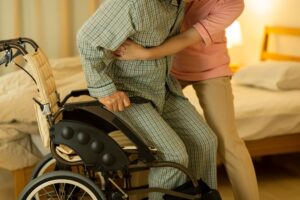Credible Witnesses in a Nursing Home Case
Nursing Home AbuseProving nursing home abuse is never simple. This gets more challenging when residents are afraid or unwilling to discuss what occurred. Then, there is the question about the mental competence of the claims others make. When you know a family member is suffering due to the negligence of a nursing home, the burden of proving this falls on your shoulders. With the help of a nursing home attorney and credible witnesses, it may be possible for you to show what occurred and prove that the nursing home should pay compensation for those losses.
Here is an example situation. A family member with a speech impediment due to a previous stroke falls at a nursing home. The patient was a fall risk, did not get the needed help, and fell. This leads to a broken bone, a hospital stay, expensive medical care, and a loss of quality of life. Proving that someone failed to provide support is challenging. Yet, there are often witnesses that can contribute to your case.
Who Can Provide Information on What Happened?
 When a victim cannot provide information about what occurred, finding secondary witnesses or others who can shed light on what occurred is an uphill battle for multiple reasons. Though legally, the nursing home may be required to provide information to the primary contact of the resident when an accident occurs or when a person’s health is at risk, they often have no motivation to do anything beyond simple communication to a family member.
When a victim cannot provide information about what occurred, finding secondary witnesses or others who can shed light on what occurred is an uphill battle for multiple reasons. Though legally, the nursing home may be required to provide information to the primary contact of the resident when an accident occurs or when a person’s health is at risk, they often have no motivation to do anything beyond simple communication to a family member.
The concern is that the nursing home may face repercussions. Lawsuits are one example of this but not the only one. Locations that fail to meet safety and health requirements may also face violations from the health department and limitations on Medicare and Medicaid compensation. For all of these reasons, most facilities do what they can to minimize risks and, even when they do occur, may not be as forthcoming as they can be.
Your task is to determine who else can prove a viable, reliable witness. This is often on a case-by-case basis, but consider some examples of additional sources of information and support that can help in this process.
Eyewitnesses
There is power in numbers. If someone witnesses another person suffer an injury, they may be willing to communicate that information, especially if they understand the significance of their testimony. However, they may not always offer it freely. They may not come forward unless you actively ask them to share what they saw. Therefore, it’s important to reach out to potential witnesses and encourage them to come forward with any relevant details they may have observed.
- Does the resident have a roommate that may have seen anything?
- Perhaps the person in the next room or across the hall heard or saw something that can be valuable information in the case?
- Perhaps another resident saw what occurred in a dining area, living space, or during an activity.
- Were there other visitors at the nursing home during the incident? If so, did they witness anything? You can use visitor logs to track down this information.
- Did the cooking staff, maintenance team, or groundworkers notice anything occurring?
Eyewitnesses must be credible, as it can be challenging to leverage their information to your advantage when their credibility may be questionable.
Staff Members
Many staff members will provide information and guidance. Do not assume that no one else did just because one person saw something and did not report it. Again, asking questions is critical since not everyone will be willing to reach out to you.
When you are working with a nursing home abuse attorney, your lawyer can require the nursing home to provide information about every person on staff at the time of the incident. They may need to do this through a court order. However, once that list is available, it may be beneficial for your attorney to interview each person to pinpoint:
- Information about the incident in question
- Discrepancies in the stories of one or more people
- Information that can help substantiate someone’s claim
Staff member interviews can be challenging. They may worry about losing their job if they make a statement. For this reason, it is always a good idea to allow your attorney to utilize professional interviewing skills to gather any available information meaningfully.
Expert Witnesses
 An expert witness is a professional who can provide insight into what occurred based on their experience and knowledge. Various types of people can offer this type of insight, and in every situation, ensuring they have all of the facts in the case that can make these statements is critical.
An expert witness is a professional who can provide insight into what occurred based on their experience and knowledge. Various types of people can offer this type of insight, and in every situation, ensuring they have all of the facts in the case that can make these statements is critical.
Medical professionals may be one party to consider talking to in this matter. A medical professional, including the resident’s doctor, can share insight into what occurred based on the information they have. For example, suppose a person is suffering from bedsores. In that case, the doctor can offer insight into whether they received proper treatment and care or if they did not. They may also offer insight into the treatment that one can expect or what they will recommend.
Clinicians and nurses at the location can also provide additional information. They can provide insight into the medical aspects of the case. This can include details on what evidence they saw, what information was limited, or what type of care was or was not approved by medical staff. There are also some instances in which a nurse may be willing to provide insight into what occurred to clear their name or to ensure the resident gets help.
Psychologists may be an option, too. Psychologists can be powerful tools in proving what occurred when the resident may be unwilling or cannot make a statement. They can discuss the impact of a person’s changing mental health, including addressing potential factors such as social isolation or the consequences of long-term emotional abuse. Psychologists can also provide documentation of changes in a person’s mental health and well-being over time.
Another factor to consider is the impact of medications on the patient. In situations where the nursing home was using medication to treat mental health conditions or to help with dementia, they may have over-medicated a person to minimize symptoms. Other times, they may not provide the right type or dosing of medication, whether due to negligence and mistakes or blatant intentional acts.
Life care planners are another expert witness who can shed light on what occurred regarding financial decision-making. The life care planner can determine if a resident suddenly changes their will or starts giving money to a nurse or staff member. These professionals may also have insight into any type of Medicaid or Medicare financial discrepancies that may also play a role in the nursing home abuse a person suffers.
Experts involved or not involved in the resident’s care
Remember to note that there are two specific types of expert witnesses to consider:
- Professionals working directly with the patient to provide care, such as their mental health providers, doctors, and nurses, who are a part of their care plan at the location or treating them at a hospital or other medical care facility
- Professionals who do not have hands-on experience with your family member but are considered reputable members of the medical profession who can attest to what abuse can do or what can cause the losses the individual suffered
Both forms of expert witnesses can prove valuable. Hiring a third-party professional is often beneficial when you do not have access to anyone providing care who wishes or is willing to attest to what occurred.
Why Do Nursing Home Credible Witnesses Matter?
Having a witness is important, but a credible witness is necessary. This person has the knowledge and ability to accurately describe what occurred or the fault involved in the case and has no reason to provide that information. For example, they are not trying to hurt the owner of the nursing home or trying to get back at the doctor.
With nursing home abuse, especially when there is ongoing abuse, habitual lies can accumulate over time. If a person lacks credibility, and this fact is evident, anything they know and share may not receive serious consideration. Recognizing the potential for manipulation and falsehoods is crucial, particularly in cases involving vulnerable individuals such as nursing home residents. Therefore, you should thoroughly vet witnesses and their credibility to ensure that only reliable information emerges in legal proceedings. Your attorney can play a vital role in assessing the credibility of witnesses and determining the validity of their testimony, helping to strengthen your case and pursue justice for victims of nursing home abuse.
Who is a credible witness in a nursing home case?
 Though various factors play a role in determining who can be considered a credible witness, keep several factors in mind. Remember to limit the use of any unreliable witness for any reason, as they can often do more harm than good to your case. However, your attorney will likely assess a person’s credibility as a witness in a nursing home case. Their experience can help determine whether a witness’s testimony is reliable and valuable in supporting your case. Some factors to consider will be:
Though various factors play a role in determining who can be considered a credible witness, keep several factors in mind. Remember to limit the use of any unreliable witness for any reason, as they can often do more harm than good to your case. However, your attorney will likely assess a person’s credibility as a witness in a nursing home case. Their experience can help determine whether a witness’s testimony is reliable and valuable in supporting your case. Some factors to consider will be:
- Can the person recall the information easily?
- Can they communicate the information?
- Does the person have the ability to listen to and respond appropriately to questions?
- Does the person demonstrate the moral ability to be truthful in what occurred? Is there any reason to believe that is not the case?
The more information you have about the witness, including their motivation, observations, statements, and cognitive mental health, the better. Your attorney can provide valuable insight into the significance of each witness before you decide to utilize them in building your case. By understanding the strengths and weaknesses of each potential witness, you can make informed decisions to strengthen your case strategy.
As for expert witnesses, they, too, must be considered credible. This can vary based on the information in the case, but some of the core factors that should be:
- Is the person qualified from a professional standpoint to offer this testimony?
- Is the party highly respected within their field?
- Are they prepared, including from factors like their knowledge of the case and, when going to court, if they are professional looking and confident in how they speak?
- Do they have the ability to gain the trust of the jury? You do not want them to appear to be a plaintiff-based witness.
- Do they have the ability to provide information in an easy-to-understand manner, such as teaching the judge or jury why what they are stating is accurate, such as in the description of medical jargon or conditions?
- Do they seem friendly and a person that the jury will relate to positively?
With so many factors to consider in selecting a witness, it can seem overwhelming to know if and when to reach out to anyone. However, if your family member suffers an injury or is possibly in a current abuse situation, don’t hesitate to call 911 and seek immediate help. Police reports can also provide credible information that investigators may utilize later, offering valuable insight into the situation.
What to Do If You Suspect Abuse in a Nursing Home Setting
Gathering all the information in a case and seeking testimonials or witness statements can be tempting if you suspect abuse. However, doing this yourself can create more obstacles for you, especially if the way you ask questions, the questions you ask, or even the accusations you make are not accurate or legal. For this reason, you want to reach out directly to a nursing home abuse attorney who can provide better insight into your legal options and how to approach any witness.
More so, attorneys know how to support you. They know how to find, evaluate, and interview witnesses effectively and meaningfully. Hiring a personal injury attorney to handle this part of the process for you may be critical to the long-term outcome of your case and to your loved one’s ability to get the help and support they need. An attorney can guide you as you explore avenues for finding credible witnesses you may not have considered. Seek out support in this very important process.
Nathan Hughey, an attorney and fourth-generation South Carolinian, founded Hughey Law Firm in 2007. Before that, he spent five years defending nursing homes and insurance companies. Leveraging his experience, he now advocates for those injured or wronged by such entities, securing over $220 million in verdicts and settlements.
